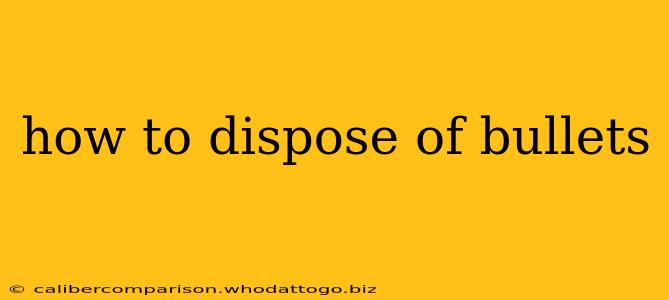Disposing of bullets, whether spent casings or live ammunition, requires careful consideration and adherence to local regulations. Improper disposal can lead to environmental contamination, accidental injuries, and even legal repercussions. This comprehensive guide outlines safe and responsible methods for bullet disposal, categorized for clarity.
Understanding the Risks of Improper Bullet Disposal
Before delving into disposal methods, it's crucial to understand the potential dangers of improper disposal:
-
Environmental Contamination: Lead, a common component in bullets, is a heavy metal toxin that can leach into soil and groundwater, harming wildlife and potentially contaminating drinking water sources. Even seemingly inert materials can contribute to environmental pollution.
-
Accidental Injuries: Improperly discarded bullets, especially live ammunition, pose a significant risk of accidental injury or death. Children or animals could easily stumble upon discarded ammunition, leading to tragic consequences.
-
Legal Ramifications: Many jurisdictions have strict regulations regarding the disposal of ammunition. Improper disposal can result in fines or other legal penalties.
Safe Disposal Methods for Bullets:
The best method for disposing of bullets depends on your location and the type of ammunition. Always prioritize safety and legality.
1. Local Law Enforcement:
This is often the safest and most recommended method. Contact your local police department, sheriff's office, or a nearby firearms range. Many law enforcement agencies have designated drop-off locations for spent casings and unwanted ammunition. They are equipped to handle disposal safely and in accordance with regulations.
2. Licensed Firearms Dealers:
Licensed firearms dealers often accept spent casings and unwanted ammunition for disposal. This provides a convenient and responsible option for many individuals. Always confirm their policy before bringing in your bullets.
3. Shooting Ranges:
Many shooting ranges provide receptacles for spent casings. However, it’s important to ensure the range accepts live ammunition before disposing of it.
4. Hazardous Waste Facilities (For Specific Cases):
In some regions, hazardous waste facilities may accept bullets, particularly those containing lead or other hazardous materials. This is usually necessary only for large quantities or specific types of ammunition, and you need to contact the facility beforehand.
Handling Spent Casings vs. Live Ammunition:
The disposal of spent casings is generally less complicated than handling live ammunition. Spent casings, while containing lead, are generally considered less hazardous. However, always follow the guidelines above, prioritizing local regulations and safe disposal methods. Live ammunition, on the other hand, requires extreme caution. Never attempt to dismantle or tamper with live ammunition.
What NOT to Do:
- Do not throw bullets in the trash: This risks accidental injury and environmental contamination.
- Do not flush bullets down the toilet: This can damage plumbing and contaminate water sources.
- Do not bury bullets: This can lead to soil and groundwater contamination.
- Do not attempt to melt or recycle bullets at home: This is extremely dangerous and potentially illegal.
Conclusion:
Responsible disposal of bullets is a vital aspect of firearm safety and environmental protection. By following the guidelines outlined above and contacting your local authorities, you can ensure the safe and legal disposal of spent casings and unwanted ammunition. Remember, prioritizing safety and compliance with local regulations is paramount.

